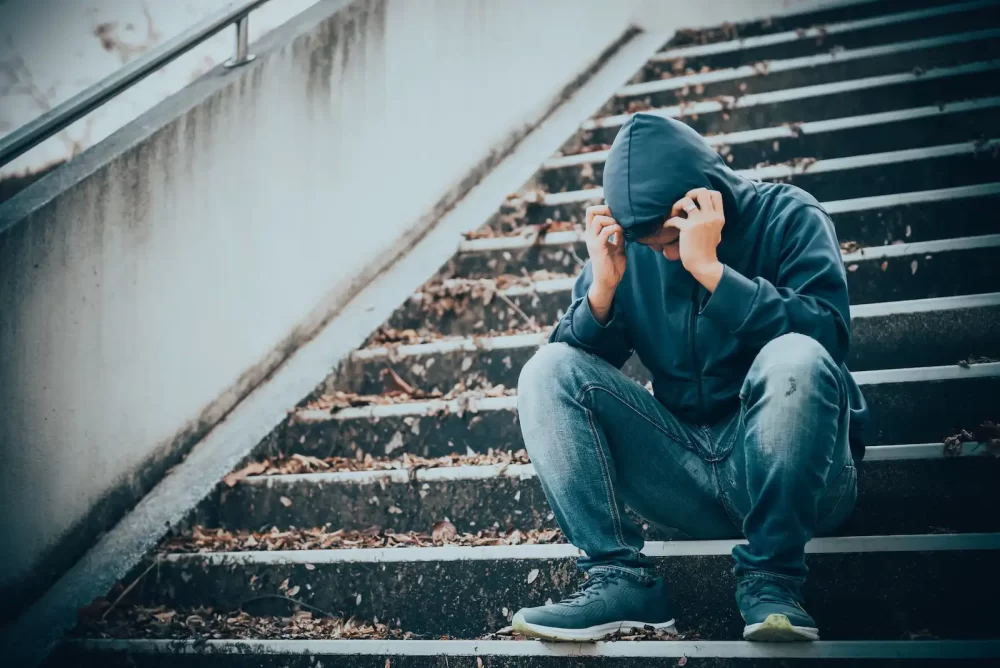Table of Contents
- How to Tell if You’re on the Road to a Possible Addiction
- Drug Addiction And Mental Illness
- How to Prevent a Drug Addiction When Experiencing Emotional Numbness
- Is A Disconnection From Your Emotions Leading To A Drug Addiction?
- Reconnecting To Your Emotions & Ending The Cycle Of Addiction
- Seeking Help for Dual Diagnosis with Emotional Numbness
Feeling disconnected from your feelings and drug use can be linked. They can connect in two ways. On one hand, emotional numbness can lead a person to use drugs to fill the void. On the other hand, drug use can lead a person to emotional numbness.
Both can cause significant harm to a person’s mental health, socio-emotional relationships, career, and personal life. Depending on the type of drug a person relies on, there can be dangerous or fatal issues. In addition, many drugs are highly addictive and can lead to a person becoming a drug addict.
Being addicted to drugs is an incredibly difficult situation. Your brain and body are working against you to tell you that you need the drugs to live your life. Your body is also trying to clean out the drugs as fast as it can so that it can operate as it normally does.
Because drugs can change how your body functions, your body can quickly become reliant on drugs. Your body can also change how different systems function to work with the drugs in your body. Once you are addicted to drugs, the risk of withdrawal or overdose becomes imminent.
Feeling disassociated from your feelings doesn’t go away easily. Emotional numbness not caused by drug addiction is often caused by mental health issues such as depression, anxiety, or social anxiety. Different prescription medications can also make a person feel emotionally numb.
Drug addictions can change the chemical balances in our brains over an extended time and can severely impact how we function and feel from one day to the next. This can lead to feelings of being disconnected from oneself and numb from one’s inner reality.
Please read on to learn more about emotional numbness and drug addiction, and the connection between the two.
How to Tell if You’re on the Road to a Possible Addiction
It may seem like a stretch, but many people experiencing mental health crises or emotional disconnection can turn to drugs to fill that void. What starts as something to make a person feel again can end up as a crippling addiction that can consume a person’s entire life.
Emotional numbness can occur for a variety of reasons. It is often understood to be a trauma response and is looked at as a symptom of untreated trauma. Untreated trauma can cause other mental health issues, such as anxiety, paranoia, depression, and others.
Disassociation from one’s feelings is one of the biggest indicators of untreated trauma. If a person does not realize that they have been traumatized and need to treat said trauma, they can search out other ways to fill the emotional void they feel.
Because they do not understand the psychology behind the feelings they are experiencing or not experiencing, they do not understand how to change their pattern of emotion. This can make a person turn to substances to try and cope.
When a person turns to substances to cope, in this case, drugs, they begin to feel something again. This is because drugs and other substances can increase dopamine levels in the body, making a person feel happy or even just normal again.
That feeling lacking in a person for so long can easily become addicting, especially because the person will return to the emotional numbness once the drugs have worn off. Unfortunately, this often leads a person to return to the drugs over and over again as a way to feel something again.
The issue with this is that the drug becomes chemically addictive in the brain because of the increased dopamine levels. It also becomes mentally addictive because of the feeling of euphoria or normalcy and causes physical dependancy.
Depending on the drugs the person relies on, they can grow a tolerance. Tolerance to a drug is when a person has taken enough of it for a long enough time that their body becomes accustomed to it. That means the user will not experience the same feelings as when they first started taking the drug.
When this occurs, the user will often increase the amount of the drug they are taking so they feel the effects again. This is often a sign of addiction. Increasing the dosage or amount of the drug consumed is also dangerous. Increased quantities of the drugs in the body can lead to accidental overdoses or toxic levels of drugs in the body.
Suppose a person begins to experience a disconnection from their emotions from taking drugs. In that case, they may try to remedy their feelings of emptiness by changing their drugs, mixing their drugs, or increasing the number of drugs they take.
This is very dangerous because the user may go through drug withdrawal by switching drugs. They may also become addicted to multiple drugs. Mixing drugs is another very dangerous method of filling the void.
Mixing drugs to decrease emotional numbness can cause overdoses, toxic or lethal drug combinations, and addiction.
If a person feels like the only way to get rid of their emotional disconnection, stemming from drug use or not, is to turn to substances, they may be at risk for drug abuse and addiction.
Another risk factor for people being unable to feel their emotions is a family history of drug use. For example, suppose a person who is experiencing a disconnection from him/herself has had a family member struggle with drug abuse or addiction or alcohol abuse or addiction. In that case, they are at a higher risk for drug addiction.
Drug Addiction And Mental Illness
The connection between drug addiction and mental illness is a real concern. More than eight million Americans battle with these co-existing conditions, also known as a dual diagnosis. It’s crucial to grasp this intricate matter to provide effective treatment and support.
Dual diagnosis simply means that an individual suffers from both a substance use disorder and a mental health disorder. These conditions can present themselves in various ways:
- Self-medication: Individuals with mental illnesses like anxiety or depression may turn to drugs or alcohol as a coping mechanism to alleviate their symptoms.
- Substance-induced mental illness: Certain drugs can trigger or worsen mental health disorders, presenting additional challenges.
- Shared risk factors: Genetic predispositions, environmental stressors, and trauma can contribute to the development of both conditions
Addressing the dual diagnosis of drug addiction and mental illness requires a specialized approach to treatment. Traditional programs designed for only one condition may not work well for individuals who feel emotionally numb. Ignoring one disorder can make the others worse, making recovery tough.
How to Prevent a Drug Addiction When Experiencing Emotional Numbness
If you or a loved one is dealing with disassociation of feeling your emotions and feel like there may be a risk of drug addiction, you must take preventative action. Preventing a drug addiction is easier than trying to break one, so it is best to plan preventatively instead.
The best way to avoid drug addiction while experiencing a disconnection from your emotions is to reach out. There are three groups to which the emotionally numb person should reach out. Firstly, they should reach out to their friends and family.
Telling friends and family about your emotional struggles may seem like a very challenging thing to do, but it is by far one of the most important parts of staying safe and healthy. Your close loved ones can help monitor your feelings and keep you engaged in other activities that are not drug-related. They can even keep an eye on you so you cannot get drugs.
The next group you should talk to is your doctors. Your doctors can help you identify possible causes for the feelings of emotional numbness. This is very important. Your doctor can help you find a therapist or a psychiatrist for you to work with to help you work through your feelings of numbness.
Is A Disconnection From Your Emotions Leading To A Drug Addiction?
Signs of emotional numbness causing a drug addiction can occur in the following ways:
- Dependency on the drug to feel happy
- Feeling empty without the drug
- Feeling like drugs give you a personality or feelings
Reconnecting To Your Emotions & Ending The Cycle Of Addiction
Therapy is one of the best ways to handle emotional numbness and feeling like you want to rely on substances. Therapists are trained in the science of our behaviors, thoughts, and patterns. They can help you see things that you would have otherwise missed. For people who may have unresolved trauma, therapy can help them to identify, unpack, and work through their trauma.
A person will generally feel a lot better when trauma is worked through. It does not happen overnight, but it is a long-term solution to feeling emotionally numb that does not include drugs.
A psychiatrist may be able to prescribe you drugs that can help the feeling of numbness go away. This is a short-term solution to the problem, and medication is typically only given to people who are also in therapy. A psychiatrist carefully monitors medication to make sure that the person does not become addicted or reliant on the medication.
Another group that you should reach out to is a drug prevention or education group. Groups like these can help educate a person on why drugs are unsafe options and how to avoid drugs. In addition, they can provide information to a person that can help them prevent getting hooked on drugs and thereby avoid addiction.
The most important aspect of solving emotional numbness and avoiding drug addiction is yourself. Therefore, taking good care of yourself and giving yourself the time you need to feel better is crucial.
Nothing lasts forever, even if it feels like it may. So while you feel numb, do things that are good for you. Try to go for walks outside, get in the sunlight, drink the recommended ounces of water daily, get good sleep, eat healthily, and visit loved ones. Do things to nourish your body and soul.
Seeking Help for Dual Diagnosis with Emotional Numbness
Living with a dual diagnosis of drug addiction and emotional numbness can feel overwhelming and isolating. But it’s important to remember that you’re not alone. Millions of people around the world struggle with similar challenges, and there is help available.
Dual diagnosis treatment programs are specifically designed to address both the addiction and the mental health condition. These programs offer a variety of therapies, support groups, and other interventions to help you heal and reclaim your life.
If you or a loved one needs help for drug addiction and mental illness, contact us today to get started on the path to wellness. Everyone deserves a healthy life free from addiction.
Sources:
Infinite Recovery has strict sourcing guidelines and relies on peer-reviewed studies, academic research institutions, and medical associations for our references. We avoid using tertiary references as our sources. You can learn more about how we source our references by reading our editorial guidelines and medical review policy.
- Hartney, E. VeryWell Mind. Using Drugs Can Make Emotional Pain Even Worse. Published May 11, 2022. Retrieved October 21, 2022. https://www.verywellmind.com/how-can-i-stop-hurting-22422
- Lindberg S. What Is Emotional Numbing? Verywell Mind. Published May 24, 2022. Accessed July 9, 2022. https://www.verywellmind.com/emotional-numbing-symptoms-2797372
- Tyler, M. Healthline. Recognizing an Addiction Problem. Published January 12, 2018. Retrieved October 21, 2022. https://www.healthline.com/health/addiction/recognizing-addiction
















